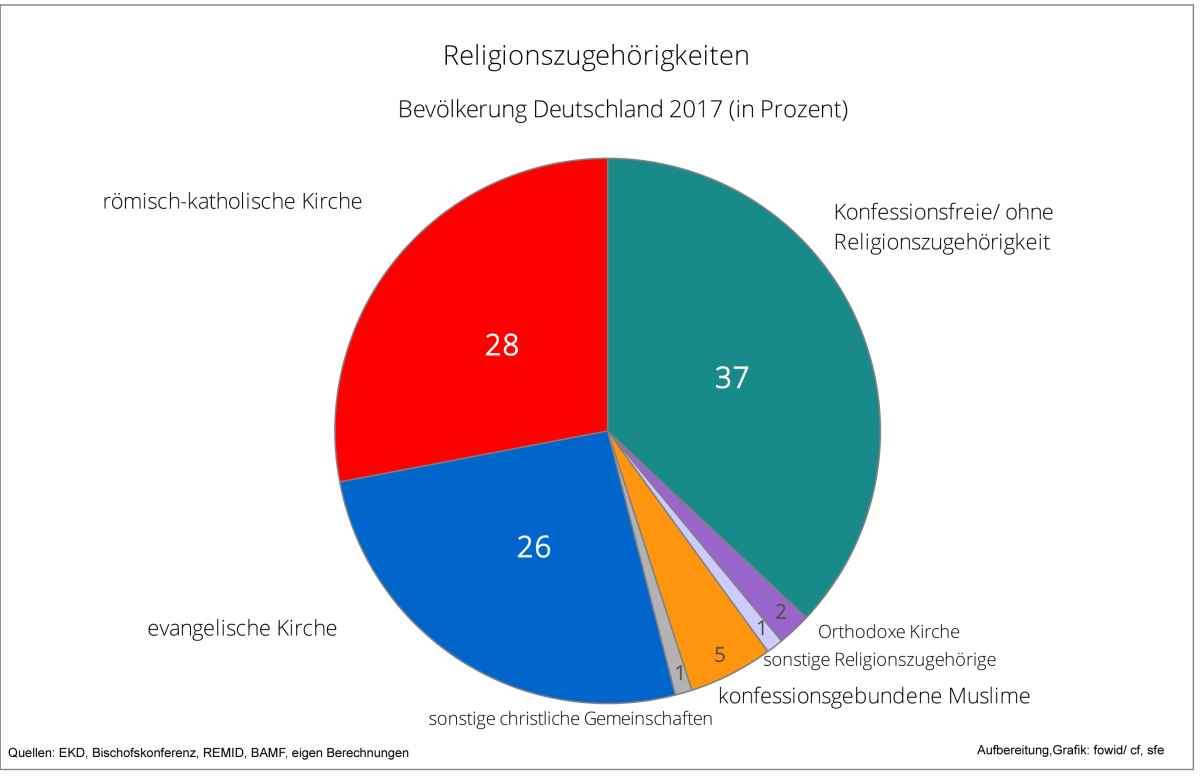
Hawkins / Atheismus
Inhaltsverzeichnis: (verbergen)
|
༺ ·❄· ༻
|
|
༺ ·❄· ༻
|
|
|
Eine EMNID-Umfrage im Jahr 1996 ergab, dass nur noch
1992, nur vier Jahre zuvor, waren noch 50% der Westdeutschen gottgläubig gewesen. Diese Daten weichen von den statis-
tischen Erhebungen des Internationalen Bundes der Konfessionslosen und Atheisten (IBKA) zur Konfessionszugehörig-
keit in Deutschland von 1970-2002 ab.

 Ödipus und Sphinx, 1808 Jean Auguste Dominique Ingres, spanischer Maler Im Jahr 2000 glaubten 85% der US-amerikanischen Bevölkerung an Gott [laut den statis-
Nur 7 Prozent der Miglieder der National Academy of Science in den Vereinigten Staaten von Artikel Naturwissenschaftler und Religion in Amerika, präsentiert von der deutschen Monats- zeitschrift Spektrum der Wissenschaft, Edward J. Larson und Larry Witham, Ausgabe 11, S. 74, 1999 Studie von Edward J. Larson, Larry Witham, Correspondence. Leading scientists still reject God, präsentiert von der wöchentlich erscheinenden englischsprachigen Fachzeitschrift Nature, Band 394 (6691), S. 313, 1998
Laut Muskelmessung von D. Hawkins befindet sich nur 1 Prozent der heutigen Naturwissen- |
|
Der Pressemitteilung zur "Studie Spiritualität in Deutschland" im Auftrag der Identity Foundation Düsseldorf im April 2007 ist zu entnehmen, dass
|
| Quelle: ► Gelöschte Pressemitteilung Repräsentative Studie der Identity Foundation über Spiritualität in Deutschland in Zusammenarbeit mit der Universität Hohenheim, Identity Foundation, Düsseldorf, April 2007 |
| Siehe auch: ► Spiritualität und ► Spiritualität |
| See also: ► Spirituality studies in Germany (2007) |
Ungeachtet seiner frühkindlichen Gotteserfahrung, seines Nahtoderlebens im Alter von 12-14 Jahren in der Schneewehe und nach einigen außerkörperlichen Eindrücken blieb Hawkins bis zum Tag seiner Erleuchtung ein passionierter Agnostiker, der
sich dem Buddhismus zugewandt hatte. Er, der als Religionist im christlichen Kulturraum aufgewachsen war, lehnte die irre-
führenden, menschlich projizierten Gottesbilder ab, wie sie beispielsweise im Alten Testament präsentiert werden.
Er bekennt, dass während der Zeitspanne von 22 Jahren als Atheist und Agnostiker seine Notstandsemotionen Stolz und Verleugnung ihn zurückgehalten haben, sich Gott zuzuwenden, ungeachtet seiner offenbarenden geistigen Erlebnisse, die
er schon von Kindesbeinen an wiederholt hatte.
Der bekennende polemisch agierende Atheist, Skeptiker, Bright und Biologe Richard Dawkins ist der Vordenker der Bewegung der "Neuen Atheisten" (NA), die dem Glauben den Kampf angesagt haben. Weitere Aktive sind Sam Harris und Alexander Smoltczyk.[*]
|
Angelehnt an das Original der Zehn Gebote übermittelt von Moses, niedergeschrieben im Alten Testament unter 2. Moses 20, 1-17 lauten die zehn Gebote der Neuen Atheisten folgendermaßen:
|
|
Im Jahr 1951 brachte der Philosoph und Pazifist ⚡ Bertrand Russell (1872-1970) die Zehn liberalen Gebote [Liberal Decalog]1 in Umlauf.
|
| Quelle: ► Titelthema-Artikel Der Kreuzzug der Gottlosen. Gott ist an allem schuld!, präsentiert von dem deutschen Nachrichtenmagazin Der Spiegel, Alexander Smoltczyk, Ausgabe 22, 26. Mai 2007 |
| Referenz: de.Wikipedia-Eintrag ► Alternative Zehn Gebote |
| Referenz: ► Artikel Die 10 Gebote, präsentiert von der Richard Dawkins Foundation, Johannes Heinle, 31. August 2017 |
|
|
| Quellen: ► Verschiedene Werke von D. Hawkins, hauptsächlich Truth vs. Falsehood. How to Tell the Difference, S. 209, 210, 2005 |
| See also: ► Distance to God ⇔ Nearness to God (Overview) |
Persönliche Bekenntnisse
Personal avowals
Atheism as an intellectual and philosophical position calibrates at LoC 165-190 – at the level of (intellectual) pride.
Persönliche Bekenntnisse
Schlussfolgerungen
|
Literaturzitate
Personal avowals
Suggesting his answer was pre-prepared
Hawking defines "God" as "principle of harmony and order".
[Übersetzt: Hawking definiert "Gott" als "Prinzip von Harmonie und Ordnung".]
Deleted YouTube video by Walter Isaacson, Albert Einstein on God, YouTube film, 4:56 minutes duration, posted 1. May 2009
Recommendation
Insights
|
Movie lines
|
Links zum Thema Atheismus / AtheismLiteratur
Literature (engl.)
Externe Weblinks
Ein Viertel der Deutschen sind Atheisten / konfessionslos. Auch Namenchristen glauben nicht an die Existenz Gottes.
Weblinks zum Thema Atheismus – QuoraBeiträge verfasst von Elfriede Ammann, präsentiert auf der kalifornischen Frage-und-Antwort Webseite Quora DE
External web links (engl.)
According to a 1998 study published in "Nature" only 7% of members of the National Academy of Science in the United States of America
Anatheism is a work of weak theology. Authors in this tradition include Richard Kearney, Ph.D., John Caputo, Peter Rollins and Gianni Vattimo.
Audio- und VideolinksAudio and video links (engl.)
Rawlings resuscitated patients on the operating table who were returning from shocking NDE experiences.
After his NDE Whittaker returned with a testimony of Hell and a transformed world view. He was also cured from his disease.
Linkless media offerings
Atheism is a transition period in which ideas about God are discarded so that a deeper perception of the divine emerge. That many people go through such phases, is widely recognised within spiritual traditions. At a cultural level the contemporary atheism is a phase leading to more vital conceptions of God.
|
Wiki-Ebene
1 A Liberal Decalogue, presented by the Sunday edition of The New York Times Magazine, 16. December 1951 ⇑
2 Truth vs. Falsehood. How to Tell the Difference, S. 209, 2005 ⇑
3 Truth vs. Falsehood. How to Tell the Difference, Kapitel 17 "Spiritual Truth", S. 388, 2005 ⇑
4 Truth vs. Falsehood. How to Tell the Difference, chapter 17 "Spiritual Truth", S. 388, 2005 ⇑